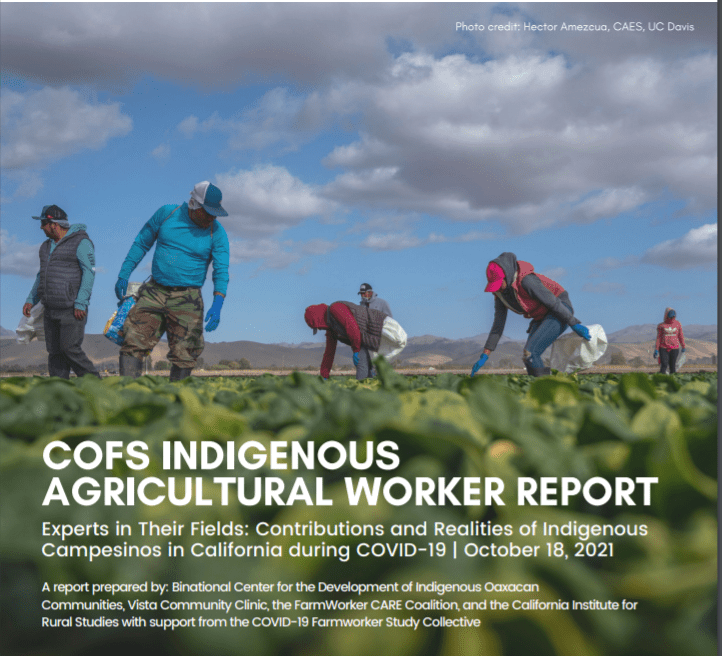Indigenous farmworkers faced further inequity and hardship at the hands of industrial agriculture during the COVID-19 pandemic, a study by 11th Hour Project grantees California Institute for Rural Studies (CIRS) and Centro Binacional para el Desarrollo Indígena Oaxaqueño (CBDIO) found. The COVID-19 Farmworker Study (COFS) includes extensive interviews with indigenous campesines and identifies policy changes that could benefit the farmworker population.
“California’s over 49 billion agricultural industry employs an estimated 800,000 farmworkers in mostly seasonal jobs — rarely holding full-time, year-round work. While all essential workers put themselves at risk when they show up for work during the COVID-19 pandemic, farmworkers face additional risks because they lack critical social safety net support afforded to others. The situation is even worse for Indigenous workers,” explained Dr. Sarait Martinez, Executive Director of CBDIO.
Indigenous migrants from Oaxaca, Guerrero and other regions of Mexico represent approximately 20% of the farm workers in California fields. For many of them, Spanish is their second language to their Indigenous languages, and for others, they are monolingual speakers to languages like Mixteco and Zapotec. Despite their expertise in the agricultural sector, study participants described economic struggles affecting their mental, spiritual and emotional health—such as housing insecurity and homelessness, affordable child care, and access to computers or wifi.

“The pandemic has magnified the inequities and dire conditions that have prevailed in the farmworker community. By bringing these stories to light, we want to uplift critical information on farmworkers’ abilities to protect themselves and their families during the COVID-19 pandemic. The time for policy to address disparities for indigenous farmworkers is now,” said Dr. Dvera Saxton, CIRS researcher.
Study collaborators seek to change the system through grassroots organizing, using research as a tool to demonstrate problems and solutions and developing open lines of communication between farmworkers and agencies. Suggested areas of improvement include healthcare free from linguistic discrimination and racism, culturally relevant doctors and healers, access to interpreters in clinics and information in Indigenous languages in the workplace, increased salaries and immediate economic support.
COFS is a collaborative research project facilitated by the California Institute for Rural Studies, with a team of social science researchers and six farmworker-serving community-based organizations. Data from the project is being put to immediate use to advocate for workers who are risking their lives every day to feed California and the nation.